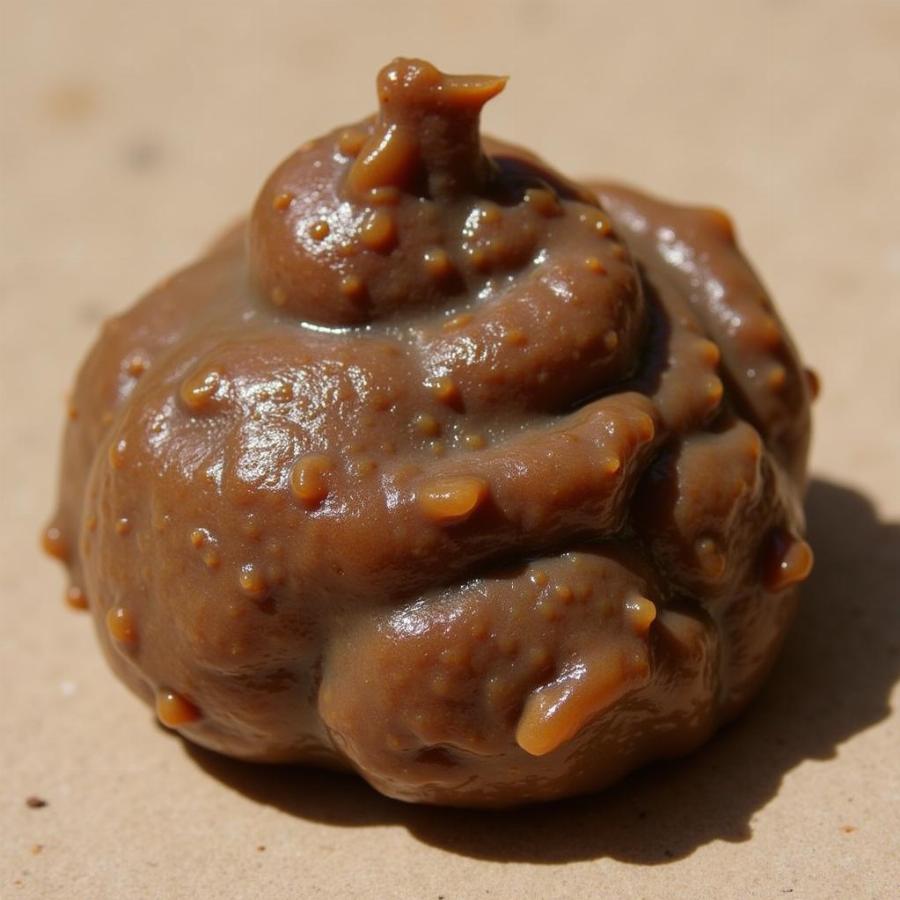Dog jelly poop, a concerning sight for any pet owner, often signals an underlying digestive issue. This article delves into the common causes, treatments, and when this symptom warrants immediate veterinary attention. We’ll explore everything from dietary indiscretions to more serious conditions so you can better understand what’s happening with your furry friend.
Decoding the Jelly in Your Dog’s Poop
Seeing jelly-like substance in your dog’s feces can be alarming. This jelly, often clear or slightly yellowish, is typically mucus. While a small amount of mucus is normal in dog poop, excessive amounts can indicate a problem. Understanding what causes dog jelly poop is the first step towards ensuring your dog’s well-being. This article will address common questions like, “Why does my dog have jelly like poop?” and “When should I be concerned about mucus in my dog’s stool?”
 Mucus in dog poop
Mucus in dog poop
Common Causes of Dog Jelly Poop
Several factors can contribute to the presence of excessive mucus in your dog’s stool. These range from relatively benign dietary issues to more serious conditions requiring veterinary intervention. Some of the most common culprits include dietary indiscretions (like scavenging garbage), inflammatory bowel disease (IBD), intestinal parasites, stress, and even certain medications.
Dietary Indiscretions
One of the most frequent reasons for dog jelly poop is scavenging. If your dog has gotten into the dog poop garbage can or eaten something they shouldn’t have, their digestive system may produce excess mucus to try and flush out the irritant.
Inflammatory Bowel Disease (IBD)
IBD is a chronic condition causing inflammation in the gastrointestinal tract. This inflammation can lead to increased mucus production, resulting in dog jelly poop. Other symptoms of IBD may include vomiting, weight loss, and changes in appetite.
Intestinal Parasites
Parasites like whipworms, hookworms, and roundworms can irritate the intestinal lining, leading to increased mucus production. Regular deworming is crucial for preventing parasitic infections.
Stress and Anxiety
Just like humans, dogs can experience stress and anxiety, which can manifest in digestive issues like dog jelly poop. Changes in routine, new environments, or even loud noises can trigger stress in dogs.
Medications
Certain medications, particularly those containing non-steroidal anti-inflammatory drugs (NSAIDs), can sometimes cause gastrointestinal upset and increased mucus production.
When to Seek Veterinary Attention
While some instances of dog jelly poop may resolve on their own, others require prompt veterinary care. If you notice blood in poop dogs along with the mucus, or if your dog exhibits other symptoms like lethargy, vomiting, loss of appetite, or weight loss, it’s essential to contact your veterinarian immediately. Similarly, if the dog has jelly like poop for more than a couple of days, a veterinary checkup is recommended.
Treatment Options for Dog Jelly Poop
Treatment for dog jelly poop depends on the underlying cause. Your veterinarian will conduct a thorough examination, possibly including fecal tests, blood work, and imaging, to determine the best course of action. Treatment may involve dietary changes, medication for parasites or IBD, or stress management techniques.
Dietary Adjustments
Switching to a bland diet can often help soothe an upset stomach and reduce mucus production. Your veterinarian may recommend a prescription diet formulated for sensitive stomachs.
Medications
If parasites are the culprit, your veterinarian will prescribe appropriate deworming medication. For IBD, medications like corticosteroids or immunosuppressants may be necessary to manage the inflammation.
Stress Management
If stress is contributing to your dog has mucus in poop, creating a calm and predictable environment can help. This might involve providing a safe space for your dog, engaging in regular exercise, and using calming aids like pheromone diffusers.
What if My Dog’s Poop Looks Like Jelly?
If your dog’s poop consistently has a jelly-like appearance, it’s crucial to seek veterinary advice. This could indicate a variety of issues ranging from dietary problems to more serious conditions. Don’t delay, as early diagnosis and treatment can significantly improve your dog’s health and comfort.
Conclusion
Dog jelly poop can be a sign of several underlying health issues. While not always a cause for immediate alarm, it’s important to monitor your dog closely and consult with your veterinarian if the issue persists or is accompanied by other symptoms. Early diagnosis and appropriate treatment are key to ensuring your dog’s well-being.
FAQ
-
Is a little mucus in dog poop normal? Yes, a small amount of mucus is typically present in dog feces to help lubricate the digestive tract.
-
What does dog poop with mucus look like? It often appears as clear or slightly yellowish jelly-like substance mixed in with the stool.
-
Can stress cause mucus in dog poop? Yes, stress and anxiety can disrupt the digestive system and lead to increased mucus production.
-
How do I treat dog jelly poop? Treatment depends on the underlying cause, which your veterinarian can determine.
-
When should I be concerned about mucus in my dog’s stool? If the mucus is excessive, accompanied by other symptoms like blood, vomiting, or lethargy, or if it persists for several days, seek veterinary attention.
-
What home remedies can I try for dog jelly poop? It’s best to consult your veterinarian before trying any home remedies, as they could potentially worsen the underlying condition.
-
Can changing my dog’s diet help with jelly poop? Yes, dietary adjustments, such as switching to a bland diet, can often help soothe digestive upset and reduce mucus production.
Related Resources on Beaut Dogs
We have other articles that might be helpful to you:
Beaut Dogs: Your Trusted Source for Dog Care Information
Beaut Dogs is your one-stop resource for reliable, in-depth information on the world of dog breeds and care. We offer comprehensive guides on breed characteristics, health, nutrition, training, and much more. When you need assistance, contact us at Email: [email protected] to get detailed and accurate answers from Beaut Dogs.